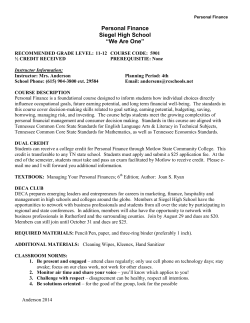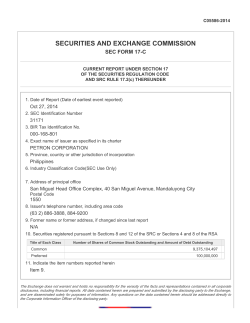
Naming Names: Washington Supreme Court Holds That Public
April 2015 Practice Group(s): Commercial Disputes Public Finance Naming Names: Washington Supreme Court Holds That Public Employers Must Disclose the Names of Employees Being Investigated for Workplace Misconduct By John T. Drake, Laura D. McAloon, Brian M. Werst and Thad O’Sullivan On April 2, 2015, the Washington Supreme Court held that public employees under investigation for workplace misconduct cannot prevent their identities from being disclosed in response to a request for public records. The decision, Predisik v. Spokane School District No. 8, explains that while public employees may oppose disclosure of specific allegations on privacy grounds, their status as public servants precludes them from asserting a privacy interest to prevent disclosure of the fact that they are being investigated. This decision provides key guidance to public employers subject to the broad public disclosure mandate of the Washington Public Records Act (“PRA”). The plaintiffs, two public school employees, were separately accused of misconduct. Both were placed on paid administrative leave pending the outcome of the school district’s internal investigations. While these investigations were under way, a local news station filed a PRA request for “information on all district employees currently on paid/non-paid administrative leave.” A second media outlet requested a copy of the letter that advised one of the employees that he had been placed on administrative leave. The employees sued the school district to prevent disclosure of their identities in response to the PRA requests. The trial court sided with the employees, ruling that their identities were exempt from disclosure under the PRA’s “personal information” and “investigative records” exemptions. Based on that ruling, the school district disclosed responsive records with the employees’ names redacted. None of these records revealed the precise nature of the allegations being investigated. The Washington Court of Appeals affirmed, holding that the employees had a protected right to privacy in their identities “because the misconduct alleged in the record[s] has not yet been substantiated.” Predisik v. Spokane Sch. Dist. No. 81, 179 Wn. App. 513, 520 (2014). The court reasoned that before any finding of wrongdoing had been made, the risk that the employees would be subjected to “gossip and ridicule” outweighed the public’s interest in learning their identities. Id. The Washington Supreme Court reversed in a 5–4 decision. The Court emphasized that public records are presumptively subject to disclosure and that statutory exemptions must be narrowly construed. It further emphasized that courts must pay particular attention to the public policy favoring disclosure of public records when deciding whether a privacy-related exemption applies—even when disclosure might “cause inconvenience or embarrassment to public officials or others.” RCW 42.56.550(3). Naming Names: Washington Supreme Court Holds That Public Employers Must Disclose the Names of Employees Being Investigated for Workplace Misconduct Applying those principles, the Court concluded that the employees had no right to keep their identities private. In so holding, the Court drew a critical distinction between the existence of the investigations themselves and the nature of the conduct being investigated. While public employees may have a legitimate interest in keeping specific allegations private, they cannot claim a protectable interest in the fact that they are being investigated. Given that public employees are paid with public funds, “the investigation is merely a status of their public employment.” The Court thus remanded the case with directions that the records be produced without redactions. The holding in Predisik, while narrow, provides needed guidance to public employers. When presented with a request for public records pertaining to an internal investigation, the employer can disclose records that do nothing more than reveal the employee’s identity. Authors: John T. Drake john.drake@klgates.com 509.241.1548 Laura D. McAloon laura.mcaloon@klgates.com 509.241.1532 Brian M. Werst brian.werst@klgates.com 509.241.1590 Thad O’Sullivan Thad.Osullivan@klgates.com 509.241.1510 Anchorage Austin Beijing Berlin Boston Brisbane Brussels Charleston Charlotte Chicago Dallas Doha Dubai Fort Worth Frankfurt Harrisburg Hong Kong Houston London Los Angeles Melbourne Miami Milan Moscow Newark New York Orange County Palo Alto Paris Perth Pittsburgh Portland Raleigh Research Triangle Park San Francisco São Paulo Seattle Seoul Shanghai Singapore Spokane Sydney Taipei Tokyo Warsaw Washington, D.C. Wilmington K&L Gates comprises more than 2,000 lawyers globally who practice in fully integrated offices located on five continents. The firm represents leading multinational corporations, growth and middle-market companies, capital markets participants and entrepreneurs in every major industry group as well as public sector entities, educational institutions, philanthropic organizations and individuals. For more information about K&L Gates or its locations, practices and registrations, visit www.klgates.com. This publication is for informational purposes and does not contain or convey legal advice. The information herein should not be used or relied upon in regard to any particular facts or circumstances without first consulting a lawyer. © 2015 K&L Gates LLP. All Rights Reserved. 2
© Copyright 2025











